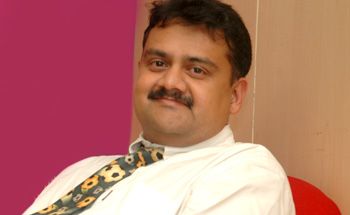
The radio industry had criticized the HRD ministry's recent proposed amendments to the Copyright Act. The industry believes it will skew the field against them and benefit the monopolistic music companies and copyright societies.
Radio Mirchi CEO Prashant Panday discusses the ramifications of the amendment, the recent meeting with the HRD Ministry and radio industry stepping into music production in a conversation with Radioandmusic.com's Anita Iyer.
Isn't it surprising that the radio industry which has been vocal about the copyright issue hasn't been consulted while proposing the amendment?
It is indeed surprising that all users (including TV and radio broadcasters) were left out when the old proposals of 2004 were re-opened. This led us to doubt the intentions and worry about the proposals. Our meeting with the HRD Ministry has allayed some of our fears and we are now awaiting details. As broadcasters, we are very pro-amendments, we in media lead the country towards progress and amendments to the old act are very welcome.
It was reported that the decision on the Copyright Amendment has already been taken and will be tabled in Parliament within a couple of weeks. What does the radio industry plan to do?
We are not exactly sure about the timeline – they could well be introduced in Parliament soon. Since our meeting with Kapil Sibal, we believe that the amendments are well intentioned. We hope that's the case.
The proposed amendment has a provision that till the time compulsory licenses are granted by the Copyright Board, the broadcasters would be required to pay the amount demanded. Has the industry accepted this?
We heard about this and are very concerned about this. The fact is that the Copyright Board should be meeting continuously just like TDSAT does. In today's age, when there are so many cases filed between the music companies and users, there is need for a full-time Board. Also, there is a need for the Board to have the authority to grant interim orders. We have made our viewpoints known to the Minister of HRD and he has assured us that these concerns will be looked at.
As you mentioned, the Copyright Board is not a full-time court with powers to grant interim relief. How do you see a way out in this situation for the radio industry?
The need of the hour is for the Board to be full-term. After our meeting with the HRD miniser, we are hopeful it will become full-term soon.
The copyright Board has been working on the royalty issue since May 2008 and no judgment has been passed in the last 18 months. What are your expectations?
I am very clear in my expectations. The Board must move quickly to stop the loot which is currently underway. The order of the Board passed in 2002 was applicable to just the 21 stations which were operating in just 12 towns. At that time, the order amounted to a sum of about Rs 10 crore (Rs one billion) to PPL. That order was obviously not intended to cover the 75 other smaller towns that have come around in Phase II (today there are about 87 operating towns – 268 channels). As a result of this anomaly, the radio industry is paying more than Rs 100 crores (Rs 10 billion) per annum. I don't think the Board intended this. It is because of the legal maneouverings of the music industry that they have been benefiting from this. The Board must quickly stop this loot.
Some of the small radio players have ventured into music production for relief from royalty. Do you see radio industry stepping into music production as a breather for the royalty issue?
If we survive, we may have to consider that also! If we did that, it will become clear whether we promote music or harm it!